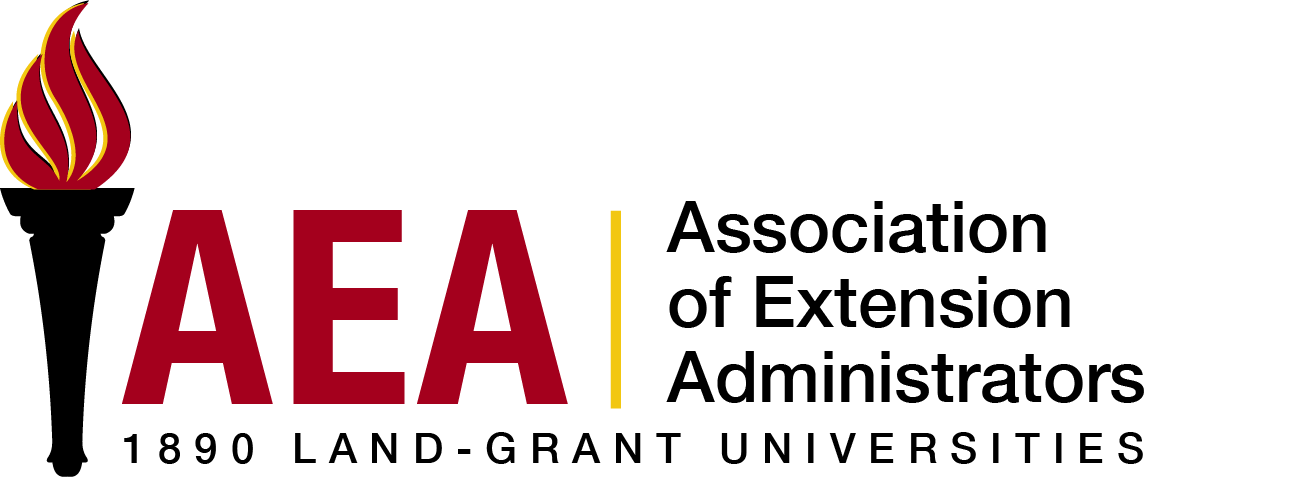Extension Today
News from and about the 1890 Land-Grant Extension SystemMessage from the Chair
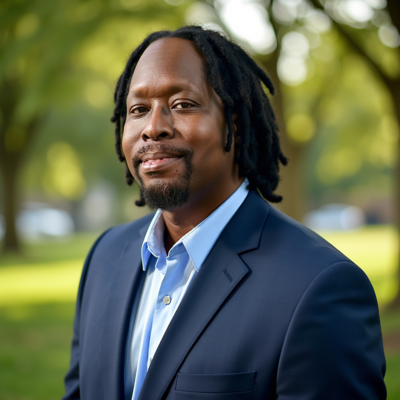
Dr. Raymon Shange 1890 Extension Administrator, Tuskegee University
Extension partnerships play a vital role in advancing the 1890 land-grant mission by fostering collaborative solutions that address the unique challenges of the communities we serve.
Through strategic alliances with government agencies, industry, local organizations and within our system, 1890 universities extend their reach and impact, delivering research-based education, promoting economic development and empowering individuals with the tools to improve their quality of life.
These partnerships not only strengthen our mission but also ensure lasting community transformation through innovation and shared purpose. Please enjoy reading this month's edition.
A farm for the people
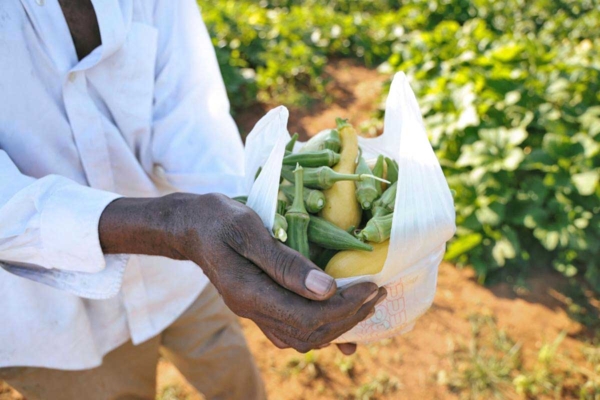
For 40 years, Alabama A&M University (AAMU) and the Madison County Commission (Commission) were in a “gentleman’s agreement” to maintain a community garden on land near the AAMU campus. In February 2024, AAMU and the commission decided it was time to take things to another level and signed a five-year agreement to establish an urban farm. The goals of this initiative are to strengthen research and outreach efforts and address food insecurity in Madison County, Alabama.
To fulfill that agreement, AAMU donated 25 acres of land, while the daily operations of the farm are managed by District 6 Commissioner Violet Edwards and her team. In addition, Alabama Cooperative Extension System staff and students at AAMU regularly provide services such as communications and marketing, pest management, crop selection, harvesting and other support to the farm. The People’s Patch also has a Facebook page where weekly harvest lists, volunteer assignments and other timely news are posted. The list of followers for the page continues to grow monthly as news spreads about where residents can pick fresh produce at no cost.
New irrigation lines, fruit trees, seating and other features have been added since the farm was established. Other plans include adding a walking trail, a demonstration site for small ruminants and other facilities for research and community outreach. This is one partnership that continues to grow each year.
Alcorn State University's Vegetable Processing Facility advances land-grant mission
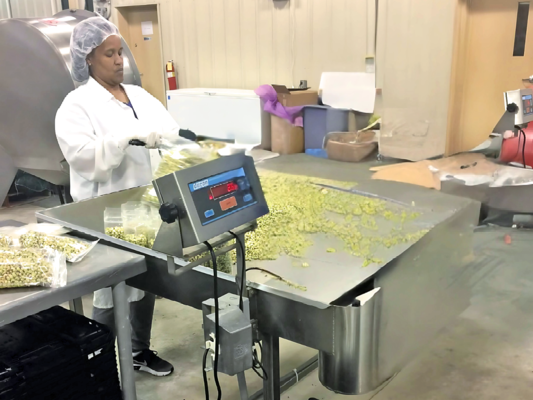
Alcorn State University's (ASU) Vegetable Processing Facility exemplifies the institution's commitment to its 1890 land-grant mission by enhancing agricultural education, supporting local farmers and fostering economic development in Mississippi's Delta region.
The facility was launched through a strategic partnership among the Alcorn State University Extension Program (ASUEP), the Quitman County Board of Supervisors (QCGS), North Delta Mississippi Enterprise Community (NDMEC), North Delta Produce Growers Association (NDPGA) and the Mississippi Association of Cooperatives (MAC).
The facility serves as a vital hub for agricultural education and support. It provides small farmers access to commercial-scale processing equipment, allowing them to add value to their crops and expand their market reach. Services include shelling and packaging peas and processing squash, greens, tomatoes and butter beans. These value-added products are distributed to local stores, including major retailers such as Walmart and Kroger, thus helping local farmers tap into broader consumer markets.
“The Vegetable Processing Facility in Marks, Mississippi, serves as a vital link in the farm-to-market pipeline, helping small farmers transform their raw produce into ready-for-market goods,” said Dr. Franklin Chukwuma, associate director of ASUEP. “This not only opens doors to major retailers like Walmart and Kroger but also promotes food security, supports rural livelihoods and strengthens the economic resilience of the Mississippi Delta.”
"The facility not only supports practical farming needs but also contributes to the economic vitality of the Delta region,” said Percy Baldwin, manager of the Vegetable Processing Facility. “It’s a real reflection of what the land-grant mission is all about — education, service and community uplift.”
Bingo meets fitness: A game-changing program helping Ohio seniors stay strong, social
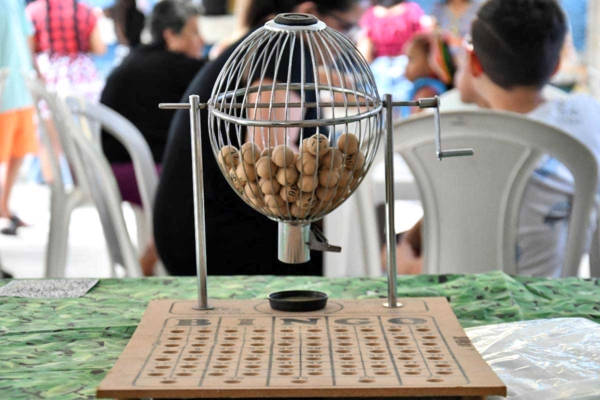
James Keys, interim program Extension associate for family and consumer sciences (FCS) with Central State University Extension, along with Juliana Wickline, family and consumer sciences Extension educator, are spearheading a unique initiative that merges physical fitness with the classic game of bingo. The program, known as Bingocize, is making a meaningful impact on the lives of older adults across Ohio by promoting physical health, social engagement and cognitive stimulation.
Offered free of charge, Bingocize classes are held twice a week over 10 weeks at local community centers throughout Ohio. Each 45- to 60-minute session combines low-impact physical exercises with rounds of bingo and short health education lessons. The program's primary goals are to enhance participants' strength, balance and mental well-being, all while making fitness fun and accessible.
"Physical activity is crucial for seniors, not just to stay fit but to help reduce the risk of falls," Keys explained. "Our classes are designed to engage participants mentally and physically, making exercise fun and accessible for everyone."
The sessions, also taught by FCS Extension educator Kylee Peoples and Expanded Food and Nutrition Education Program educator Donna Kuykendall, incorporate balance drills, stretching routines and muscle-strengthening exercises, tailored to accommodate various fitness levels. However, it's not just the exercise that draws participants in — it's the atmosphere. The laughter, camaraderie and friendly competition turn each class into a vibrant social gathering.
Carol King, of Dayton, shared, "I feel stronger and more flexible. Bingocize makes exercising fun, and I love the social aspect of playing bingo with my friends!"
Delaware State University SNAP-Ed: Transforming nutrition education
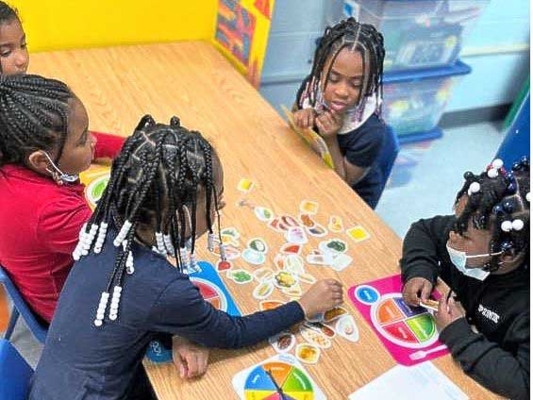
Delaware State University’s (DSU) Supplemental Nutrition Assistance Program Education (SNAP-Ed) has built a strong foundation through longstanding partnerships with school districts and community organizations across New Castle, Kent and Sussex counties.
These collaborations have enabled DSU to deliver impactful nutrition education and promote healthier lifestyles among low-income students, families and communities. The program has partnered with 19 schools in New Castle County alone, including Marbrook, Richardson Park and St. Peter Elementary Schools, engaging 4th-grade classrooms for nearly two decades. At Marbrook Elementary, SNAP-Ed’s involvement in events like the Multicultural Family Fair highlights its commitment to cultural inclusion and community building through health education.
Beyond schools, DSU SNAP-Ed has extended its reach to community centers, Boys and Girls Clubs and faith-based organizations, including a new partnership with the Newark Boys and Girls Club and Maple Lane Elementary. These organizations offer safe, enriching environments where DSU delivers both in-school and after-school nutrition programming.
These partnerships allow SNAP-Ed to provide education through evidence-based curricula like Serving Up MyPlate and Choose Health: Food, Fun and Fitness, while addressing broader community health needs. SNAP-Ed educators also participate in quarterly meetings with Delaware’s state coalition, reinforcing alignment with federal and state wellness initiatives. These community-driven efforts not only support DSU’s land-grant mission of service and outreach but also enhance its ability to address health disparities.
By leveraging trusted relationships with schools and organizations, DSU’s SNAP-Ed program continues to expand its reach and impact, promoting long-term, sustainable health improvements across Delaware.
DREAM project: Inspiring students to discover possibilities in agriculture
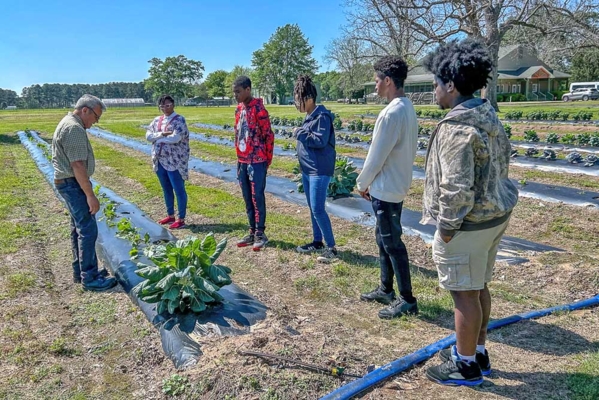
By Conchita Newman
This spring, local high school juniors and seniors participated in the 2025 Diverse Research Experiences for Agricultural Majors (DREAM) Spring Immersion series. Hosted by Florida A&M University's (FAMU) College of Agriculture and Food Sciences (CAFS), the month-long program introduced students to career opportunities in food, agriculture and natural resource sciences (FANH).
Students engaged in weekly field visits to businesses and organizations representing CAFS majors, including animal science, food science, agribusiness, entomology, plant and soil science and biological systems engineering. The series began at FAMU’s 267-acre Research and Extension Center, where students explored aquaculture, sustainable pest management and high tunnel farming.
Throughout the program, students toured vertical planters, strawberry rows, an apiary, a kombucha brewery, a nursery and a drone research center. These immersive experiences revealed the wide range of careers in agriculture, from research and environmental science to agribusiness and engineering.
The DREAM program not only builds awareness of FANH career pathways but also fosters leadership and hands-on learning. Connecting classroom concepts with real-world applications, it helps students view agriculture as a vital, innovative field with endless possibilities.
Fort Valley State’s Extension assists residents impacted by Hurricane Helene
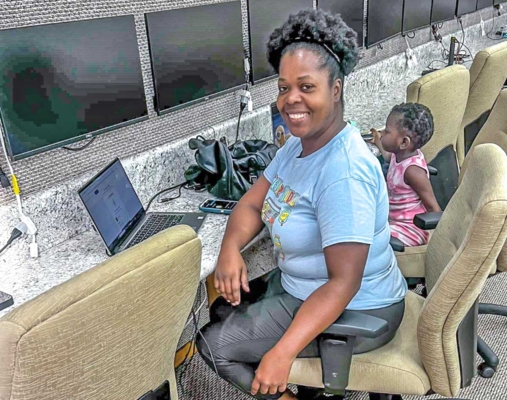
By Russell Boone Jr., Public Information Editor/Writer
Residents of south Georgia impacted by Hurricane Helene were able to receive some relief through Fort Valley State University’s (FVSU) Cooperative Extension.
Connecting with city officials in Hahira, FVSU’s Mobile Information Technology Center (MITC), a high-tech computer classroom housed in a 72-foot semi-trailer, equipped with 20 individual training stations and an onboard 35-kilowatt generator, traveled to Lowndes County to assist community members.
Jennifer Price, director of Main Street for the city of Hahira, expressed relief when she found out that FVSU Extension could aid the community. She said after contacting Joshua Dawson, FVSU Extension agent for Lowndes County, in two hours, the MITC arrived and was up and running in Hahira.
Residents were able to gain internet access to complete work projects and plan for cleanup and seek assistance from state and federal agencies. Dawson said he knew that Lowndes needed resources due to power outages.
“With widespread power outages, people still needed to work and contact others. Having this available to the community and the surrounding areas has been vital to local businesses and people who need some relief,” Dawson said.
Celebrating more than 20 years of Bluegrass Beekeeping School
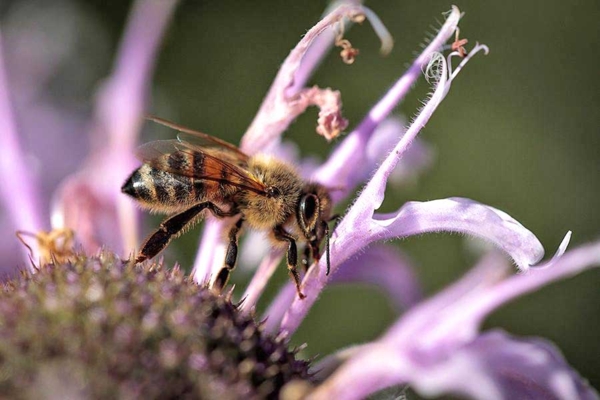
The Kentucky State University (KSU) campus was buzzing with excitement on March 8 as more than 260 beekeeping enthusiasts from Kentucky, Ohio, and Indiana visited the campus for the 2025 Bluegrass Beekeeping School. The Bluegrass Beekeeping School has taken place at KSU for more than 20 years in partnership with the Bluegrass Beekeepers Association and Capital City Beekeepers.
The event provides both novice and experienced beekeepers with a multitude of sessions with topics ranging from basic beekeeping equipment and getting started, candle making and using wax, to enhancing pollen substitutes to promote honey bee health, and more. This year’s keynote speaker was Dr. Michelle Flenniken, who presented on the topic, “The Impact of Viruses on Honey Bee Health at the Colony, Individual Bee and Cellular Levels.” Flenniken is a professor in the Plant Sciences and Plant Pathology Department at Montana State University.
Dr. Thomas Webster, KSU professor and Extension specialist for beekeeping and beekeepers, attributed the continual popularity of the program to the growing community of beekeepers and enthusiasts.
“[Participants] can get a lot of information all in one day. There are many people with expertise, many people giving presentations and there are also vendors that they can buy from. It’s very convenient for them to buy beekeeping equipment right there,” he said. “It’s a good way to spend a Saturday in March if you want to get into beekeeping. You learn a lot at once.”
This program exemplifies KSU's dedication to fostering environments that enhance and support the needs of those we serve.
Langston University champions efficient resource use: Turning whey into worth for small farmers
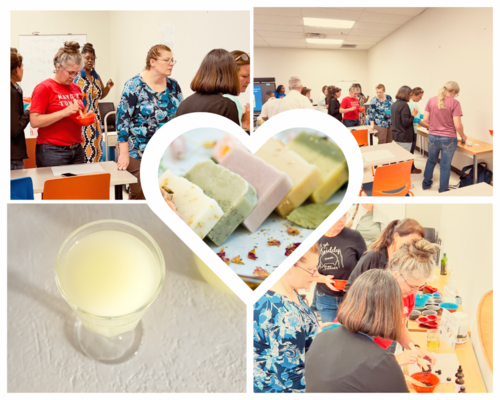
At the Sherman Lewis School of Agriculture and Applied Sciences, the Value-Added Products Team is advancing sustainable agriculture by helping small ruminant farmers integrate circular economy principles into their operations. Through hands-on engagement, they have identified a growing interest in artisan soapmaking, often viewed as more profitable than selling goat cheese. However, they advocate for a more balanced, resource-efficient approach that maximizes both economic and environmental benefits.
In their cheesemaking and soapmaking workshops, they demonstrate how farmers can optimize milk usage by repurposing whey, a natural byproduct of cheesemaking, for soap production. Instead of using whole goat milk, rich in valuable proteins needed for food products, this approach ensures milk’s nutritional value is retained while transforming what would typically be discarded into a secondary, high-value product. By adopting this model, small farmers can diversify their revenue streams, reduce waste and promote sustainable farming practices.
This initiative reflects three key pillars: relevance, response and results. It tackles a real-world challenge — waste in small-scale dairy processing (relevance), offers hands-on education in value-added product development (response) and delivers measurable outcomes — more sustainable practices, increased income opportunities and stronger community engagement (results).
The workshops, including those co-led by Langston alumna Krystle Robinson-Hershey, have received enthusiastic feedback from participants eager to apply these sustainable techniques. The university looks forward to showcasing this work at the upcoming Langston University Conference on Food and Agricultural Systems: Goats, Hair Sheep and Emerging Technology, themed "Growing Together: Fostering Resilient Communities, Food & Agricultural Systems."
For more details on the conference, visit https://bit.ly/4hcO4FJ.
Building healthier communities together: Impact of partnerships in the 1890 mission
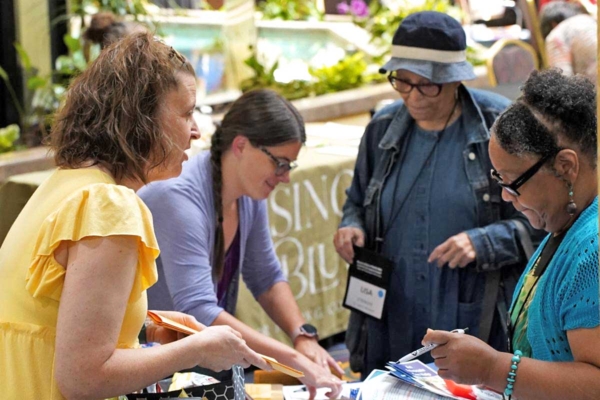
For more than three decades, the Paula J. Carter Center on Health and Aging (PJCCHA) at Lincoln University Cooperative Extension has collaborated with the Missouri Department of Health and Senior Services (DHSS) to provide health education to underserved communities. Through this partnership, they bring the 1890 land-grant mission to life by connecting individuals to resources, raising health awareness and creating meaningful change across Missouri.
“The Department of Health has been with us from the beginning, offering expertise and guidance that shaped our ability to respond to the needs of the communities we serve,” says PJCCHA Director Yvonne Matthews. “Their support has been instrumental in advancing the work we do.”
DHSS staff serve on the center’s advisory board, guiding key initiatives and ensuring community outreach is backed by the necessary resources. A major focus of this collaboration is addressing critical health issues, such as brain health and cancer prevention. With DHSS support, the center offers workshops and webinars and invites experts to educate older populations on risk factors and early warning signs.
Much of this work is carried out by lay leaders — trusted community members trained by the center to share health knowledge with others. These leaders also serve as a vital link between the community and DHSS, helping shape future programming through shared insights.
“Implied in the term collaboration is the essence of Cooperative Extension,” says Matthews. “For partners to achieve a shared objective requires cooperation, commitment to a shared goal, collective effort and an understanding that we are better together than we are apart.”
N.C. A&T Extension uses $25M Google grant to boost AI education
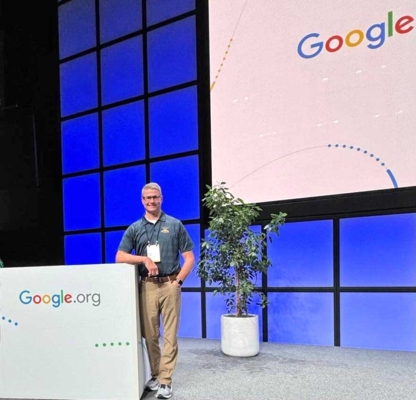
Artificial intelligence (AI) increasingly plays a role in our lives. Mark Light, Ph.D., wants to ensure that North Carolina 4-H agents and youths have the opportunity to understand AI and put it to use as a tool for learning and discovery.
Light is the 4-H STEM (science, technology, engineering and mathematics) specialist with N.C. A&T Cooperative Extension and the statewide lead of a new, two-year $225,000 grant from Google. The grant is part of an overall $25 million Google initiative to develop AI literacy among educators and students, teaching them to use AI in the classroom and beyond.
The Google initiative targets 10 states and five youth organizations, including 4-H. Its overall goal is to equip more than half a million educators and students across the U.S. with foundational AI skills through the development of AI curricula, training and meaningful, inclusive AI learning experiences for youth audiences.
“You hear so much about AI and a lot of times we think of the negative,” said Light. “What we want to do is turn this dialogue around and look at AI from a positive standpoint and say, 'How can we use AI in everyday life to improve things and help ourselves?'"
Rather than each state providing an AI curriculum, educators from the 10 states supported by the grant (Colorado, Florida, Indiana, Iowa, Nebraska, Ohio, North Carolina, South Carolina, Utah and Pennsylvania) have formed a National AI Curriculum Committee, co-chaired by Light, that will develop 4-H curricula and best practices for using AI.
Partnership to strengthen South Carolina
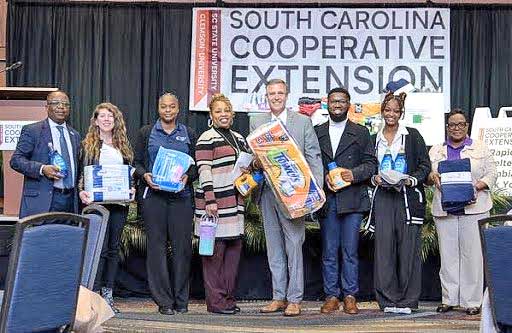
South Carolina’s two land-grant institutions, South Carolina State University 1890 Extension and Clemson Cooperative Extension, partnered to host the 2025 South Carolina Joint Cooperative Extension Conference from Feb. 12-14 at the Columbia Metropolitan Convention Center.
The conference theme, “Innovating Together: Strengthening Public Service Through Collaboration,” gathered more than 300 Extension professionals for three days of networking and workshops, creating impactful strategies to enhance collaboration between the two institutions.
The conference featured a service project that collected donations, which were presented to Rapid Shelter Columbia during a special event. Rapid Shelter Columbia provides temporary transitional housing units for unsheltered clients in the capital region. Columbia Mayor Daniel Rickenmann was present to accept the donations.
Expressing gratitude on behalf of Rapid Shelter Columbia, Rickenmann said, “[The donations] will provide our residents with items they need to stay safe and comfortable as they work toward securing stable housing. We’re thankful to everyone involved in this collaborative effort and are encouraged by the collective compassion shown by the state’s Cooperative Extension professionals.”
"The joint conference presented an opportunity for both institutions to grow, connect and share a renewed commitment to serving the citizens of South Carolina,” said Dr. Edoe Agbodjan, associate Extension administrator. "It was exciting seeing both institutions unite to strengthen Extension through meaningful conversations and collaborations that will impact our communities moving forward.”
SU Ag Center partners with Soundminds Counseling to provide free virtual mental health services
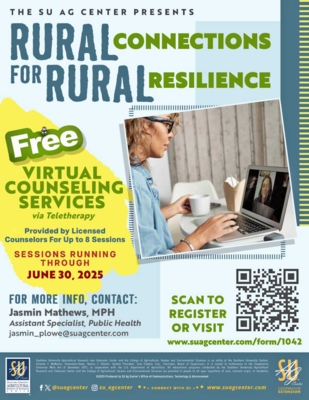
The Southern University Ag Center is providing free virtual counseling services to Louisiana residents living in rural communities through its Rural Connections for Rural Resilience Program.
The program, which is open to adults, aims to combat alarming mental health trends by providing free teletherapy services to rural communities where access to mental health services is often limited due to geographical barriers. According to the National Rural Health Association (NRHA), suicide rates are nearly 50% higher in rural areas compared to urban areas.
“There’s a lot of stigma that surrounds seeking mental health services. I want people to know that seeking help is not a sign of weakness. It is absolutely a sign of strength,” expressed Jasmin Mathews, assistant public health specialist at the Southern University Ag Center.
The center’s mobile technology unit is also available to provide Wi-Fi for individuals who do not have internet access. The program will run on a rolling basis until June 30, offering eight free counseling sessions with licensed mental health professionals through a collaboration with Soundminds Counseling.
To date, the program has helped about 50 Louisiana residents get access to therapy sessions. To learn more about the Rural Connections for Rural Resilience Program, visit https://www.suagcenter.com/news/7300.
Bridging gaps: Extension partnerships boost 1890 mission in Lauderdale County, Tennessee
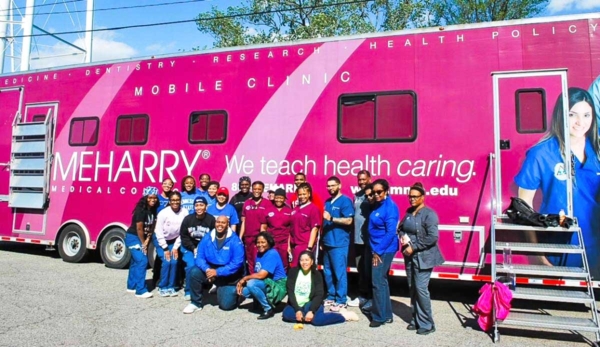
By Rita Fleming
Collaborative outreach through Extension partnerships is vital for maximizing the impact of the 1890 land-grant mission and fostering community well-being. A successful two-day health fair in Lauderdale County demonstrated this synergy, uniting local leaders, Meharry Medical College's School of Dentistry, Tennessee State University's (TSU) Department of Human Sciences and TSU Extension specialists in a concerted effort to bridge health gaps.
The fair prioritized adult immunizations and preventive health care, vital areas often neglected in rural settings. Local leaders, with their deep understanding of community needs, facilitated access and trust, which is essential for effective engagement. Meharry’s dental students offered invaluable screenings and education, emphasizing the oral-systemic health connection. TSU Extension Specialist Rita Fleming and Dr. Brionne Lockett delivered impactful presentations on chronic disease prevention and men’s health.
This collaboration transcended simple service provision. It fostered a knowledge exchange, empowering residents to make informed health choices. The partnership strengthened the 1890 mission by directly addressing health inequities, promoting preventative care and building sustainable community capacity.
This impact was so profound that this partnership has developed into additional partnerships in counties surrounding Lauderdale for health education programs. These initiatives highlight the transformative power of Cooperative Extension efforts, ensuring land-grant benefits reach those who need them most, especially in rural areas.
TU Extension partners with others to improve clients' operations
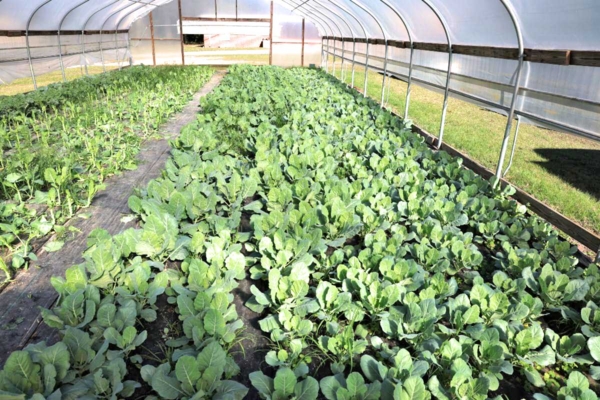
The Tuskegee University (TU) Cooperative Extension system is proud to use partnerships to continue to improve the lives of its clients and to expand its operations. The Food Safety Outreach Program is one such initiative and partnership.
TU, Alabama A&M University and Auburn University are collaborating to develop a value-added curriculum aimed at minimizing postharvest loss, improving product quality and enhancing food safety for small, limited-resource growers in the Black Belt region. This initiative, inspired by George Washington Carver's legacy, seeks to equip farmers with crucial technical skills in cooling, sorting, grading and packaging through impactful experiential learning.
Building on the foundational content of the "Small-Scale Postharvest Handling Practices: A Manual for Horticultural Crops" from UC Davis and the innovative approach of the 2019 U.S. Department of Agriculture Food Safety Outreach Program-funded Mobile Farm Innovation Project, this project specifically addresses postharvest challenges.
The core objectives include developing comprehensive curriculum materials to support these goals, piloting the hands-on program with Black Belt farmers, rigorously evaluating the effectiveness of the piloted materials and finalizing and widely disseminating the resources. Furthermore, the project emphasizes capacity building within the land-grant system and the Black Belt farming community, actively engaging the next generation of food safety professionals and farmers throughout material development and implementation.
To date, TU has convened its advisory group, incorporating valuable insights into the project's direction, and has produced a rough draft of the first factsheet, which focuses on greens. Future data and results from this program are forthcoming. For more information, contact Dr. Kristen Woods at Kwoods2@tuskegee.edu.
$80,000 awarded in NIL partnership with UAPB athletics, 1890 ASAP program
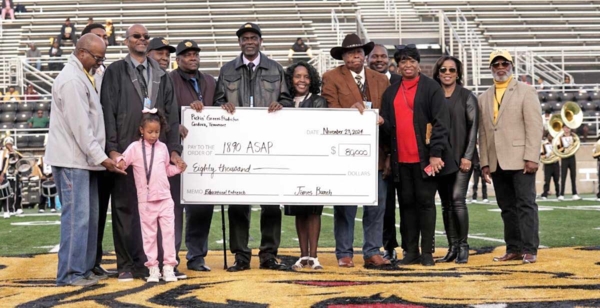
The University of Arkansas at Pine Bluff (UAPB) Athletics Department recently partnered with James Bunch, president of PickinGreens Productions, and the 1890 Agriculture and Student Athletes (ASAP) Project to receive an $80,000 award in name, image and likeness (NIL) contracts. The 1890 ASAP program is twofold: it aims to promote equity and sponsor opportunities for the 1890 student-athletes at UAPB, supporting them academically, athletically and professionally. Secondly, ASAP provides a platform to encourage these athletes to be ambassadors for agriculture.
Bunch, a UAPB agriculture alumnus, explained with his partners on the project, Johnnie Young and Theodis Bunch, that this opportunity is to build awareness and create interest in agriculture as a thriving career path.
“Agriculture provides a unique chance for today’s generation to build self-sufficiency, food security and land stewardship through hands-on skills,” he said. “By engaging these young student-athletes, we are reaching a generation that can lead our communities toward sustainable, resilient futures.”
The 1890 ASAP program launched Feb. 1 and will continue until May 31. The program already has 28 student-athletes enrolled with NIL contracts. The student-athletes will use their social media influence to raise awareness about agriculture industries, agriculture careers and business opportunities among their peers and followers.
Bunch explained that this partnership with UAPB athletics is a pilot to kick off this program for all 1890 institutions.
“This is unique; it’s never been done before, and utilizing athletes will help us get attention on agriculture while also giving these young people in the 1890 system opportunities to gain sponsorship support,” said Bunch.
VSU’s foundational partnership brings combined expertise, resources to Virginia’s communities
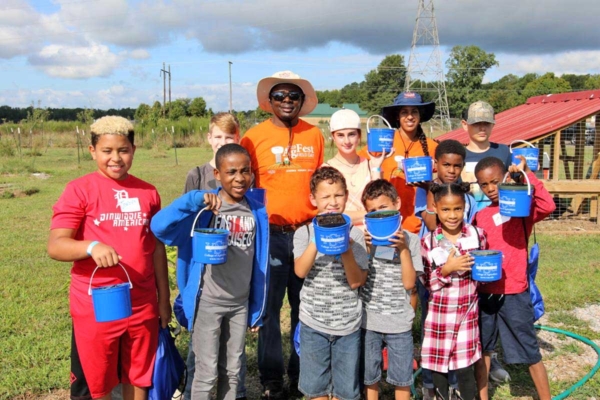
Virginia State University (VSU) collaborates with a wide range of external organizations, including businesses, state agencies and community groups. However, its foundational partnership is with Virginia Tech (VT) through Virginia Cooperative Extension (VCE), established in 1914. As part of a state-mandated collaboration, VSU and VT combine their expertise and resources to support the well-being of Virginians across the Commonwealth.
"VCE is unique," says Dr. Janine Woods, associate Extension administrator at VSU. "We are one Cooperative Extension system across two universities, and we share the same county agents, as agreed upon in a 1950s MOU. This ensures a unified approach to service delivery across Virginia."
This partnership brings together specialists across all key areas in Extension. These specialists work together to deliver tailored, research-backed solutions that meet the social, economic and environmental needs of Virginia's communities.
The collaborative efforts between VSU and VT were especially evident during the recent flooding that devastated southern Virginia. VSU provided the trailer that transported supplies from eastern Virginia to southwestern Virginia, while administration from both institutions met in the early morning hours every day to provide support to those communities.
“VCE coordinated the delivery of hay from eastern Virginia and organized farmers with horses to access flooded areas where roads had washed out,” says Woods. “While other emergency responders leave when the immediate crisis is over, VCE remains to support recovery and rebuilding.”
With the combined knowledge and resources of both universities, Extension at VSU is addressing critical challenges and working to create sustainable solutions that uplift all Virginians.
Nourishing futures
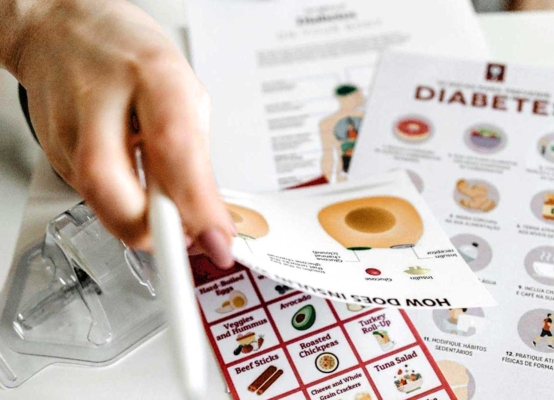
By Alisha Jarrett
The West Virginia State University (WVSU) Extension Family and Consumer Sciences (FCS) department has partnered with local schools to implement the OrganWise Guys Program, an evidence-based initiative to enhance children’s health and academic performance. This curriculum is designed for busy educators who prioritize improving children’s well-being. It includes comprehensive lesson plans, implementation guides and online training sessions, making onboarding straightforward and outcomes measurable.
The program boasts several benefits, including statistically significant improvements in children’s health, literacy and test scores while addressing critical social and emotional well-being aspects. Additionally, the curriculum aligns with science, technology, engineering and mathematics (STEM), health and physical education standards and is supported by digital and physical resources featuring content in English and Spanish. Teachers receive pre-/post-tests and a data collection tool to monitor progress.
“The OrganWise Guys Program empowers children to understand their bodies and make healthy choices through engaging characters,” WVSU FCS Extension Educator Tammy Hauldren explained. “It fosters lifelong habits that promote better health, which is especially vital for West Virginia students, as obesity rates are notoriously high in our state.”
In addition, a parent from West Teays Elementary stated, “My son, Jared, has diabetes and has thoroughly enjoyed the OrganWise Guys lessons at school. He was excited to share his knowledge about the pancreas and its role in the body! This program has had a wonderful influence on him.”
Together, WVSU and local schools are fostering a healthier future for West Virginia youths.
